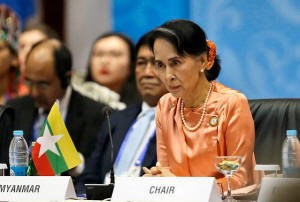|
China draws three-stage path for Myanmar,
Bangladesh to resolve Rohingya crisis
 Send a link to a friend
Send a link to a friend
 [November 20, 2017]
By Yimou Lee [November 20, 2017]
By Yimou Lee
NAYPYITAW (Reuters) - China called for a
ceasefire in Myanmar's Rakhine State so that Rohingya Muslim refugees
can return from Bangladesh, proposing a three-stage approach to the
crisis as diplomats from 51 mostly Asian and European countries gathered
in Myanmar on Monday.
More than 600,000 Muslim Rohingya have fled to Bangladesh since late
August, driven out by a military clearance operation in Buddhist
majority Myanmar's Rakhine State.
Amid a burgeoning humanitarian catastrophe, rights groups have accused
the Myanmar military of atrocities, while foreign critics have blasted
Aung San Suu Kyi, the Nobel peace prize winner who leads a civilian
administration that is less than two years old, for failing to speak out
more strongly.
On Monday, Suu Kyi opened an Asia-Europe Meeting for foreign ministers
that had been scheduled in Myanmar before the outbreak of the crisis.

Speaking in the capital of Naypyitaw on Sunday, having arrived from
Dhaka, China's Foreign Minister Wang Yi said China believed Myanmar and
Bangladesh could work out a mutually acceptable way to end the crisis.
"The first phase is to effect a ceasefire on the ground, to return to
stability and order, so the people can enjoy peace and no longer be
forced to flee," China's foreign ministry said in a statement, citing
Wang.
"With the hard work of all sides, at present, the first phase's aim has
already basically been achieved, and the key is to prevent a flare-up,
especially that there is no rekindling the flames of war."
During a meeting on Sunday, the ministry said, Wang told Myanmar
President Htin Kyaw, "As a friend of both Myanmar and Bangladesh, China
is willing to keep playing a constructive role for the appropriate
handling of the Rakhine State issue."
Visiting Myanmar last week, U.S. Secretary of State Rex Tillerson made
many of the same points, but he also called for a credible investigation
into reports of atrocities.
REPATRIATION PROCESS
Once a ceasefire is seen to be working, Wang said talks between Myanmar
and Bangladesh should find a workable solution for the return of
refugees, and the final phase should be to work toward a long-term
solution based on poverty alleviation.
Myanmar and Bangladesh officials began talks last month to settle a
repatriation process for Rohingya refugees, which Bangladesh expects to
take to the next level in coming days.

Speaking on the sidelines of the ASEM meeting, European Union foreign
policy chief Federica Mogherini said, "We believe that stopping the
violence, the flow of refugees and guaranteeing full humanitarian access
to Rakhine state, and safe, sustainable repatriation of refugees are
going to be key."
Mogherini, who also visited Bangladesh over the weekend, said, "There's
a real possibility of Myanmar and Bangladesh reaching a memorandum of
understanding and agreement for the safe repatriation of refugees to
Myanmar."
The European bloc was ready to help with the process, she added.
[to top of second column] |

Myanmar State Counselor Aung San Suu Kyi attends the 13th Asia
Europe Foreign Ministers Meeting (ASEM) in Naypyitaw, Myanmar,
November 20, 2017. REUTERS/Stringer

It was unclear, however, whether a safe return was possible, or
advisable, for the thousands of Rohingya women and children still
stranded on the beaches trying to flee hunger and instability in
Rakhine.
Myanmar intends to resettle most refugees who return in new "model
villages", rather than on the land they previously occupied, an
approach the United Nations has criticized in the past as
effectively creating permanent camps.
Besides restoring peace for Rohingya to return, Myanmar also had to
resolve the issue of their citizenship, having treated them as
stateless for decades, the U.N. High Commissioner for Refugees,
Filippo Grandi, told a news conference in Tokyo.
The UNHCR was ready to assist both countries with repatriation, he
said, adding that it could help Myanmar with the citizenship
verification of the Rohingya. Until now it has not been invited to
participate in either.
"Much as resources are needed in Bangladesh to respond to the
crisis, the solutions to this crisis lie in Myanmar," Grandi said.
VIOLENCE LARGELY OVER
The crisis erupted after the military launched a brutal
counter-insurgency operation against the militants after attacks on
an army base and 30 police posts in Rakhine on Aug. 25.
Myanmar's military has said that all fighting against the Rohingya
militants died out on Sept.5.

The group behind those attacks, Arakan Rohingya Salvation Army
(ARSA), had declared a one-month ceasefire on Sept.10, which was
rejected by the Myanmar government. But there have been no serious
clashes since.
The United States and other Western countries have become more
engaged with Myanmar since it began a transition to civilian
government after nearly 50 years of military rule.
Myanmar's generals retain autonomy over defense, internal security
and border issues in the current power-sharing arrangement.
China, with close ties to both Myanmar and Bangladesh, has long been
a key player in lawless borderlands where rebel ethnic groups have
battled Myanmar's government for decades in a conflict driving
thousands of refugees to seek shelter in China.
(Reporting by Ben Blanchard in BEIJING, Antoni Slodkowski in YANGON
and Thomas Wilson in TOKYO; Editing by Simon Cameron-Moore)
[© 2017 Thomson Reuters. All rights
reserved.]
Copyright 2017 Reuters. All rights reserved. This material may not be published,
broadcast, rewritten or redistributed.
 |